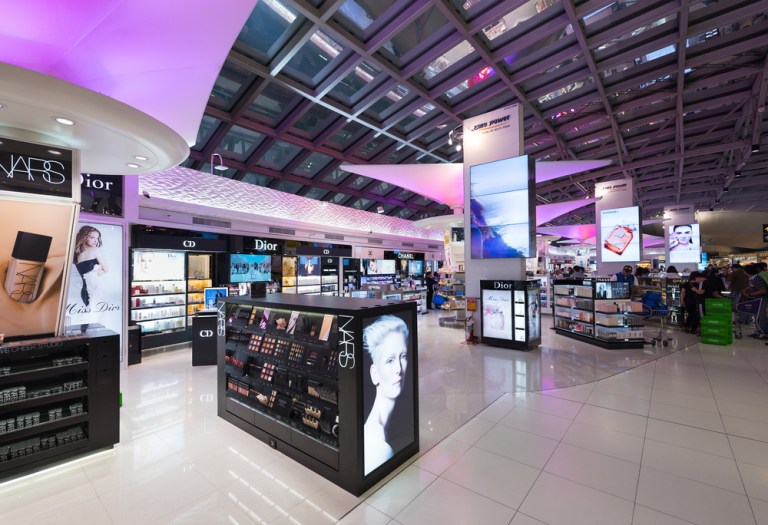NARS Cosmetics Puts Its Best Face Forward With AI, Data

When it comes to standing out in the $445 billion beauty industry, it all comes down to personalization, says Benjamin Lord, executive director of global eCommerce and omnichannel sales at NARS Cosmetics. In the latest Omni Developer Report, Lord gives PYMNTS an inside look at how the company is utilizing data collected from AR cosmetic mirrors to develop custom products ranging from lipsticks to coverups. Plus, how the 24-year-old retailer is pivoting its omni offerings to keep up with digital natives.
The beauty industry brought in more than $445 billion in sales in 2017, marking 5 percent growth over the year before.
The industry is booming, and consumers who shop for beauty products have no shortage of brand options in stores and online. From up-and-coming players like Beautycounter and Glossier to more prominent companies like Estee Lauder and Clinique, the beauty market is increasingly oversaturated with both old and new options.
With that saturation has come growth in competition, making it difficult for beauty brands to stand out in the space, according to Benjamin Lord, executive director of global eCommerce and omnichannel at NARS Cosmetics.
“There are traditional players, and now there are digital native brands and startups, so the cosmetics industry has become a very crowded industry,” he said. “So, it [is now] very important for us to become more customer-centric and offer more personalized experiences to shoppers in this space.”
In a recent interview, Lord explained how NARS is working to carve out its niche by investing in data and personalization tools for both online and offline customers. The goal is to provide beauty customers with a simple and enjoyable omnichannel experience — one that will keep them coming back to shop with the brand again and again.
Beauty Buyers Go Digital
The cosmetics industry has offered a decidedly low-tech customer experience for decades, revolving around beauty counters with human associates making recommendations and demonstrating new products. But things have changed over the last few years, Lord noted. Younger consumers and startup firms have pushed companies to embrace new technology, especially when selling to online or mobile shoppers.
NARS has already seen a shift in consumer habits in Asia, with countries like China likely topping $1 trillion in online retail sales in the coming years. It’s also seeing a similar shift in the U.S., where it primarily sells online and in large department stores like Macy’s.
“We have to think globally and make sure our omnichannel frameworks and strategies are flexible and ready to adapt to those changes around the globe,” Lord said. “We do that by focusing on integration between eCommerce sites, social media and marketing efforts, and the stores and boutiques we own.”
NARS has also looked to keep up with rising consumer expectations by investing in solutions that can provide an increasingly digital customer base with access to the connected commerce features they crave.
Lord pointed to NARS’ parent company, Japanese luxury beauty conglomerate Shiseido, which also owns a range of beauty brands like bareMinerals and Dolce & Gabbana’s fragrance, makeup and skincare lines. Shiseido acquired AI and AR developer Giran in 2017, in a move motivated by a desire to get ahead of a tech trend in the space, connect with younger consumers and sell more products via digital channels.
“Digital technology, things like augmented reality and artificial intelligence, have become very crucial pieces in transforming the beauty industry,” Lord said.
The push toward digital sales seems to be working for NARS and Shiseido. Conglomerate CEO Masahiko Uotani told The Japan Times that online and mobile sales now account for 25 percent of the company’s revenue, and just over 6 percent of the entire beauty industry.
Using Data to Build New Personalization Products
In the months since Shiseido’s Giran acquisition, other companies in the space have looked to make similar moves involving AR and AI technology.
The advantage for NARS is that it owns and has access to data produced by Shiseido’s AR cosmetic mirror and apps, in addition to incorporating the tech before other larger players in the space. While this tech is becoming more common, NARS is using that data to build new personalized products for customers.
“I think it’s important to have and own your technology,” Lord said. “It means you’re going to be able to get more data points and more information about your customers. If you work with a third-party provider, and there are a lot of them, the experience will still be great. But, more often than not, they own the data. Because we own that technology, we can capture much more data, and I think that’s where a lot of value comes in.”
Shiseido also recently acquired Massachusetts-based artificial skin technology startup Olivo Labs and California-based personalization solution provider MATCHCo. The goal is to help NARS and its other beauty brands create the next wave of cosmetics technology.
“This data is helping us learn more about our customers’ skin tones to build new products, or about their preferences and behaviors to help give them a more personalized and seamless experience,” Lord explained. “I think it’s really about owning your tech so it can inform personalization going forward — not only online, but offline as well.”
For better or worse, the beauty market is moving away from in-store beauty counters and toward the digital age, he added. Those that don’t hop on board now risk getting lost in the crowd.
About the Report
The Omni Developer Report™ a Vantiv, now Worldpay, collaboration, provides the payments ecosystem with a view of how software developers are using new technologies to create innovative business opportunities, and enabling merchants to optimize the ways they engage with shoppers today. The developer community within the report is separated into three categories: shopping and payments, operations and marketing.
